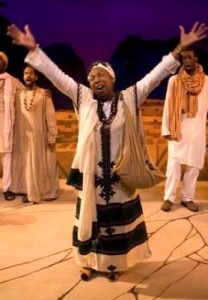RECOMMENDED
Sonia Levitan’s award-winning young adult novel The Return has been turned into a musical, entitled simply Return, with often powerful results.
For those who’ve not read it, Publishers Weekly described The Return as “a glorious, heartrending account of Operation Moses, the airlift of Ethiopian Jews from the Sudan into Israel, as seen through the eyes of Desta, 12.”
In Return (the musical), with book and lyrics by Levitan, Desta is considerably older than 12, but her story remains the same. Publishers Weekly continues: “Desta’s family belongs to a small community of Jews in dire poverty, isolated in the mountains and terrorized by Ethiopia’s communist regime. A dream foretells the arrival of other Jews promising freedom in Israel; subsequently Desta’s older brother (Joas), along with her betrothed, Dan, and his family, are chosen to travel to the Sudan, where they will be flown to Israel. The journey becomes a nightmare for them all.”
From the moment the first strains of “Song Without Words” are heard, Return transports us to another land, very Lion King-esque, but without the animals. We see the village life of these desert potters, and their native dances, graceful and athletic, and we meet Desta (who could be anywhere between 16 and 26), “a dreamer, her mind in the clouds.” As Desta recounts her dream in song, shadow figures illustrate it on the upstage wall’s African sky.
Dan and Desta clearly have different dreams for themselves. While macho Dan just wants someone to take care of him and his house, the castle where he is King, feminist Desta dreams of education, and a job as a teacher. Clearly this is not a match made in heaven.
Grandma Weizero interprets Desta’s dream to mean that strangers are coming to town, and in fact two strangers do arrive, and white ones at that, the first ever to be seen by Desta’s people. They are middle-aged brother and sister Menachem and Barbara, arrived from America, shocked to learn from Desta that “they told us we were the only Jews left.” Desta and her family can hardly believe that there are actually Jews in America, and though they have never heard of Israel, they have heard of Jerusalem and long to make the journey there.
Once Desta learns that an escape from Ethiopia and (destination Jerusalem) is possible, she finds herself energized by the possibility, especially once she learns that “in Israel, girls go to school. They learn to read.” Still she is fearful of facing a world of danger, that is, until her younger sister Almaz is taunted by a pair of soldiers who hold her upside down and strike the soles of her feet again and again with a stick. From then on, Desta is determined to leave, and to take with her Almaz and Joas. When Granny Weizero pleads to go with them, Desta reluctantly agrees, and the foursome leave their village for the dangerous walk through the desert to Sudan.
By far the best thing about Return is Kevin William Anderson’s beautiful, catchy, and very eclectic score. “Song Without Words” is reminiscent of the opening strains of The Lion King’s “Circle Of Life,” the pulsating beats of “Falasha” (i.e. stranger) and “City Of Soul” are dance club-ready, “What Can You Do With A Stick” and “Kat Kat Kat” are out-and-out hip hop, Desta’s “How Can I Say Goodbye” could easily be a hit ballad for Beyonce, and the gorgeous, show-stopping “Hourglass” (aka Still In My Heart) ends Act 1 with cheers, in a bravura performance by Paula Bellamy-Franklin as Weizero. Some may find Anderson’s score too contemporary for the story; I didn’t.
Act 2 highlights include the frightening chant of “War, War, War!,” Joaz and Desta’s soulful duet “Return To Me,” the mournful Arabic notes of “Jerusalem,” and the abstention-friendly love duet “Let’s Wait.” Several characters appear in Act 2 with their own songs to sing. An equally suffering Muslim father, mother, and child sing the lovely “Welcome Stranger” after Desta gives them her beautiful beads so that they can buy food for them all to share. (Conveniently, there are never any language barriers in the Africa of Return.) Later, Itzhak, The List Maker, whose job it is to decide who will get passage to freedom and who is too ill to make the journey, sings the emotion-packed “Who Will Survive.”
Though there is some unevenness in the performances, there are numerous standouts in the large cast. Terry Norman is a lovely and golden-voiced Desta, Jermel Nakia brings real emotion to Joas (and sings a gorgeous “Jerusalem”), and Bellamy-Franklin brings her decades of experience and wisdom (and her glorious voice) to the role of Weizero. Stasha Surdyke and Steve Yudson are moving as the Muslim couple, and the multitalented Surdyke also shines as Barbara. Clent Bowers makes a powerful 11th hour experience as Itzhak, understudy Tony Melson did fine work as Dan, dueting a lovely “Return To Me” with Norman. Young understudy Ashley Marie Arnold gave her all to the role of Almaz. Renda Pettis and Anthony Salas combine voices for the emotional “Children.” There are also the spectacular (though underused) Lulu Washington Dance Theatre dancers, Jermaine Johnson, Adamu Ideozu, Cara McGee, and Haniyyah Muhammad.
Return is not without its shortcomings, but as a work in progress, they are resolvable. Levitan’s dialog can seem a tad stilted, and though some actors speak with an appropriately African lilt, others sound American, to somewhat jarring effect. Invisible food and balm seem out of place too, in a production where nothing else is pantomimed.
The somewhat unfinished aspect of Return may be due to legendary director/choregrapher Donald McKayle’s illness, which prevented him from being at the final weeks of rehearsals (though happily he was well enough to attend opening night last week). With some script doctoring, additional dances, and greater attention to details, Return would seem to be an ideal selection for the Pasadena Playhouse. (Sheldon Epps, are you reading StageSceneLA.com?)
Chris Hansen’s Africanesque scenic design is simple and mostly effective, though Return cries for the kind of gorgeous full-scale set it would get at the Playhouse, just as Anderson’s music and orchestration would sound even better backed by a live orchestra rather than sung to prerecorded tracks. Jessica Champagne’s costumes are absolutely wonderful, though, and Don Guy’s lighting complemented by Kara Miller’s video design are both first rate.
Return scores highest marks for its lofty aspirations, and though its execution could use some tweaking, it is most definitely a show with promise, and I believe, a future ahead of it.
Edgemar Center for the Arts, 2437 Main St. Santa Monica.
www.returnthemusical.com
–Steven Stanley
June 13, 2008





 Since 2007, Steven Stanley's StageSceneLA.com has spotlighted the best in Southern California theater via reviews, interviews, and its annual StageSceneLA Scenies.
Since 2007, Steven Stanley's StageSceneLA.com has spotlighted the best in Southern California theater via reviews, interviews, and its annual StageSceneLA Scenies.







 COPYRIGHT 2024 STEVEN STANLEY :: DESIGN BY
COPYRIGHT 2024 STEVEN STANLEY :: DESIGN BY